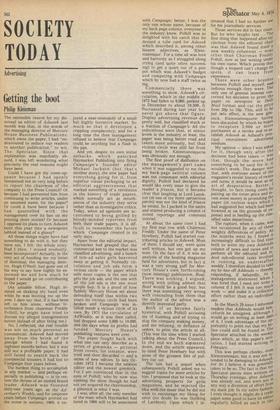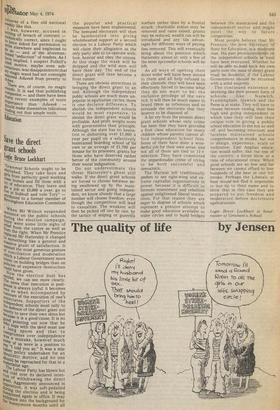Advertising
Getting the boot
Philip Kleinman
The ostensible reason for my dismissal as editor of Adweek last month was that, in the words of the managing director of Mercury House Business Publications, which owns the paper, I had "en deavoured to seduce our readers to another publication," to wit, The Spectator. Since that explanation was manifestly absurd, I was left wondering what precisely the real reasons might have been.
Could I have got my come-uppance because I had openly threatened not so very long before to report the chairman of the company to the Press Council? Or because I had prevented him from continuing to write articles, under an assumed name, for the paper?
Or could it have been because I had quarrelled with the management over its ban on my printing short stories? Or because I opposed its plans to turn Adweek later this year into a newsprint tabloid instead of a glossy?
All those things might have had something to do with it, but they were not, I felt, the whole story.
Had 1 then, I mused modestly, been incompetent? Actually, in the very act of handing me my letter of dismissal, the managing director, Hugh O'Neill, had gone out of his way to say how highly he esteemed me and how much he hoped I would go on contributing to the paper.
(An amiable fellow, Hugh insisted on shaking rriy hand even while he was booting me up the arse. I dare say that, if it had been left to him alone, without in terference from chairman Freddy Polhill, he might have tried to discuss my alleged transgressions before instead of after firing me.) No, I reflected, the real trouble was not so much personal as commercial. Adweek had moved away from the brink of the precipe where I had found it eighteen months before, but it was still not a profitable paper, it had still failed to snatch back the commercial trousers it had lost to Campaign four years before.
The hardest thing to accomplish in any market — and perhaps es pecially in publishing — is to res
tore the throne of an ousted brand leader. Adweek was founded sixty-one years ago, as the Advertiser's Weekly, and for umpteen
years before Campaign arrived on the scene in autumn, 1968, it en joyed a near-monopoly of a small but highly lucrative market. So much so that it developed a crippling complacency, and for a long time the then management refused to believe that Campaign could be anything but a flash in the pan.
And yet, despite its own initial setbacks which panicked Haymarket Publishing into firing Campaign's founder editor Michael Jackson (but that's another story), the new paper had everything going for it, from superior visual packaging to an editorial aggressiveness that marked something of a revolution in the history of trade papers, which normally act as mouthpieces of the industry they serve rather than as investigative critics. Today, when ad agencies are accustomed to being grilled by bloody-minded reporters from both their trade papers, it is difficult to remember the furore which Campaign created in its early days.
Apart from the editorial impact, Haymarket had grasped that the commercial key to the market was classified advertising, and a bunch of tele-ad sales girls beavered away at getting it. Normally circulation and job ads form a vicious circle — the paper which sells most copies is the one that gets the job ads, and the one with all the job ads is the one most people buy. It is a proof of how flabbily Mercury House set about defending itself that within two years its vicious circle had been broken and Campaign was intalled inside a vicious circle of its own. ,By 1971 the circulation of AdWeekly, as it was then called, had dropped some 3,000 to 10,000, and the days when its profits had funded Mercury House's publishing ventures were over.
The paper fought back with what one can only describe as a series of gimmicks — pictorial front covers, for instance, were tried and then discarded — and a series of new editors. In late October 1972 I became the newest editor and the newest gimmick. For I am convinced that in the eyes of Polhill, who by now was running the show though he had not yet acquired the chairmanship, a gimmick is what I was.
I was, after all, the only member of the team which Haymarket had hired in 1968 still to be associated with Campaign; better, I was the only one whose name, because of my back page column, everyone in the industry knew. Polhill was so delighted with his catch that he devised a tube card for Adweek which described it, among other bizarre adjectives, as 'Kleinmanesque'. For a time all was love and harmony as I struggled along trying (and quite often succeed. ing) to get a quart out of a pint pot which was Adweek's budget and competing with Campaign which by now had a staff twice as big.
Commercially there was something to show. Adweek's circulation, which in the middle of 1972 had fallen to 9,000, perked up in December to about 10,500. It fluctuated during last year but never got above that figure. Display advertising revenue did pretty well, but classified stuck at a fraction of Campaign's. All the ' indications were that, at senior levels in the industry at least, the paper was being better read and taken more seriously, but that vicious circle was still far from being broken. Kleinmanesquerie was obviously not enough.
The first proof of disillusion on the management's part came when it was suggested to me that my back-page satirical column was not consonant with editorial dignity. Polhill had declared he would like every issue to give the reader a frisson, but it became clear that laughing at Lord Lambton (in one or my more uproarious pieces) was not the kind of frisson he meant. So I packed in the satire and started producing a column of mixed reportage and comment ,instead.
At about the same time I had my first real row with Chairman Freddy. Under the name of Peter Howbury, Polhill had started contributing articles to Adweek. Most of them, I should say, were quite well written, but one got up my nose. On the face of it, it was an analysis of the boating magazine field for advertisers, but in fact it was a very strong puff for Mercury House's own forthcoming (now existing) publication, Boat.
There was nothing, I argued, wrong with telling admen that Boat would be a good buy, but there was something very wrong with concealing from them that the author of the advice was a directly interested party.
Both of us became fairly hysterical, with Polhill accusing me of humbug and of trying to stop the company making money, and me refusing, in defiance of orders, to print the article at all. (This was the time when I started talking about the Press Council.) In the end we both simmered down, and the article appeared, by-lined Peter Howbury but with some of the grossest bits of puffery cut out.
The tale had a sequel when subsequently Polhill asked me to suggest topics for more articles by him. I proposed that he look at the advertising prospects for girlie magazines, and he rejected the idea with the sneer that he did not wish to encourage my liking for smut (no doubt he was thinking of Lambton). Upon which I in
Spectator May 4, 1974 timated that I had no further use for his journalistic services.
Those services did in fact cease.
But he who laughs last ...The first thing that happened after My ejection from the editorial chair was that Adweek found itself a new weekly columnist — none other than Chairman Freddy Polhill, now at last writing under his own name. Which proves that though a leopard can't change its spots, it can learn from experience.
There were other brushes between Polhill and myself, and , tedious enough they were. The only one of general interest concerned his decision to print the paper on newsprint in DailY
Mail format and cut the price from 20p to 10p. This, still to.be put into effect, is the new gum mick, Kleinmanesquerie having been discarded, by which he hopes
to recapture 2,000 or more purchasers at a stroke and re-establish Adweek as Adland's principal recruitment advertising medium.
for yitoptinhioonug—h soi nncleyI awfatseraskthede decision had been taken — Was that, though the move had something to be said for it, It wouldn't work. The danger was mthaagt,azwinitehs aware of history of the mthaagt,azwinitehs aware of history of the of twists and turns, it would be seen as an, act of desperation. Better, thought, to face rising costs .bY putting up the cover price and invest some money in promoting the paper (in various ways which I had suggested but which had been frowned at on the grounds of expense) sales department. pbaeret beefing p the classified rupture, when it came, was not occasioned by any of these weighty differences of policy. As the months went by I found It increasingly difficult to find time both to write my own Addenda column of news and views and .° perform all the editorial and in" deed sub-editorial tasks involved in running an understaffed weekly. I therefore decided to take my by-line off Addenda — therebY responding, if belatedly, to 3 management statement when I was hired that I need not write a column if I felt it was too mnch work — and make it a scollective effort rather than an individual one. In the March 29 issue I informed readers that Addenda would henceforth be unsigned, although I would go on writing at least Part of it. I took advantage of the opportunity to point out that my b,Y: line could still be found in The Spectator attached to the weeklY piece which, at this paper's illy.'" tation, I had started writing la February. This was perhaps cheeky, even Kleinmanesque, but it was not intended to be damaging to Adweek nor do I believe it was generallY taken to be so. The fact is that mY Spectator pieces were written naz. Thursday evenings, after Adwee." was already out, and were not in any way a diversion of effort from my main job. In my naïve fashion, I even thought it might do a trade paper somebilled a
to havechhasvueitsnelditthner
cniurrins of a fine old national Weekly like this. was, however, accused in Writing of breach of contract 7-ttechnically correct, since I ought °.have asked for permission to _rte elsewhere and neglected to ti s° — and of the aforemenCned "seduction" of readers. As I implied, I suspect Polhill's 0velef motive, maybe even sub`unscious, was disappointment that rtqn.lagic wand had not overnight stored Adweek from poverty to riches. There are, of course, no magic Wands. It is sad that publishing cc/rnPanies — and there have been , '.''anY recent examples of more fliportance than Adweek — srn Gold make themselves ridiculous out that simple truth.



































 Previous page
Previous page